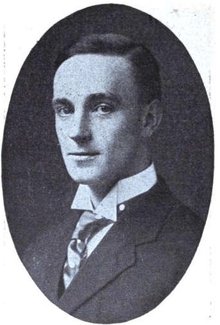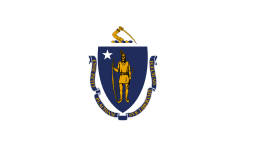William Francis Murray
| William Francis Murray | |
|---|---|
 William Francis Murray circa 1912[1] | |
| Member of the U.S. House of Representatives from Massachusetts's 10th district | |
|
In office March 4, 1913 – September 28, 1914 | |
| Preceded by | James Michael Curley |
| Succeeded by | Peter Francis Tague |
| Member of the U.S. House of Representatives from Massachusetts's 9th district | |
|
In office March 4, 1911 – March 4, 1913 | |
| Preceded by | John A. Keliher |
| Succeeded by | Ernest W. Roberts |
| Massachusetts Executive Council | |
|
In office 1910–1911 | |
| Massachusetts House of Representatives | |
|
In office 1907–1908 | |
| City of Boston Common Council | |
|
In office 1904–1904 | |
| Personal details | |
| Born |
September 7, 1881 Boston, Massachusetts |
| Died |
September 21, 1918 (aged 37) Boston, Massachusetts |
| Political party | Democratic |
| Alma mater |
Harvard College Harvard Law School |
| Profession | Attorney |
| Military service | |
| Years of service | 1898 |
| Rank | Corporal |
| Unit | United States Volunteer Signal Corps |
| Battles/wars | Spanish-American War |
William Francis Murray (September 7, 1881 – September 21, 1918) was a U.S. Representative from Massachusetts and the Postmaster of Boston.
Born in Boston, Massachusetts, Murray attended the public schools and the Boston Latin School. He was graduated from Harvard University in 1904 and from Harvard Law School in 1906. Practiced law in Boston. He served during the Spanish-American War as a Corporal in the United States Volunteer Signal Corps. He served as member of Boston Common Council in 1904 and 1905. He served as member of the State house of representatives in 1907 and 1908. He served as member of the Governor's council in 1910.
Election to Congress
Murray was elected as a Democrat to the Sixty-second and Sixty-third Congresses.He served as a Member of Congress from March 4, 1911, until September 28, 1914, when he resigned, having been appointed postmaster of Boston.
Postmaster of Boston
On June 19, 1914 President Wilson nominated Murray for the position of Postmaster of Boston.,[2] the Senate Confirmed the nomination on July 16, 1914.[3] Murray served as postmaster from October 1, 1914, until his death on September 21, 1918.
Death
In the Autumn of 1918 Murray contracted the Spanish flu[4] and died from pneumonia at Boston City Hospital at 11:40 on the night of September 21, 1918.[5]
Burial
Murray was interred in Holyhood Cemetery, the Chestnut Hill section of Brookline, Massachusetts.[6]
References
- ↑ Who's who in State Politics, 1912, Boston, MA: Practical Politics, 1912, p. 24.
- ↑ WM. F. Murray To Be Named For Postoffice Here: Charlestown Congressman's Name to Be Sent to Senate at Once by President Wilson, It Is Said, Boston, MA: The Christian Science Monitor, June 19, 1914, p. 1.
- ↑ WM. F. Murray Is Confirmed, Boston, MA: The Christian Science Monitor, July 22, 1914, p. 1.
- ↑ Harvard Alumni Bulletin Vol XXL, Number 3., Boston, MA: The Harvard Bulletin, Inc., October 10, 1918, p. 70.
- ↑ Postmaster Murray Dies of Pneumonia: Boston Loses Beloved Citizen and Nation a Faithful Official, Boston, MA: The Boston Daily Globe, September 22, 1918, p. 1.
- ↑ Final Tribute To Postmaster Murray, Boston, MA: The Boston Daily Globe, September 25, 1918, p. 12.
Bibliography
- Who's who in State Politics, 1912 Practical Politics (1912) p. 24.
- United States Congress. "William Francis Murray (id: M001117)". Biographical Directory of the United States Congress.
| United States House of Representatives | ||
|---|---|---|
| Preceded by James M. Curley |
Member of the U.S. House of Representatives from Massachusetts's 10th congressional district March 4, 1913 – September 28, 1914 |
Succeeded by Peter Tague |
![]() This article incorporates public domain material from the Biographical Directory of the United States Congress website http://bioguide.congress.gov.
This article incorporates public domain material from the Biographical Directory of the United States Congress website http://bioguide.congress.gov.

